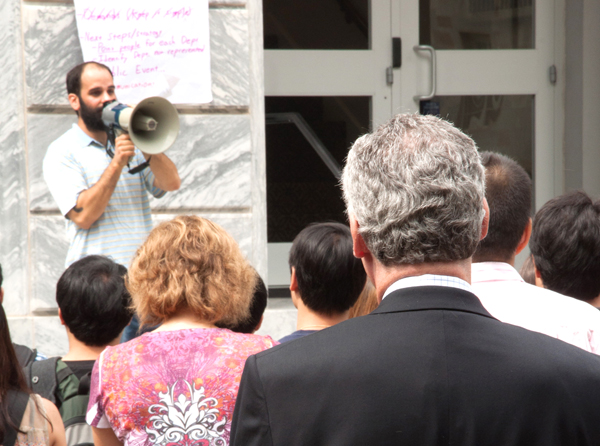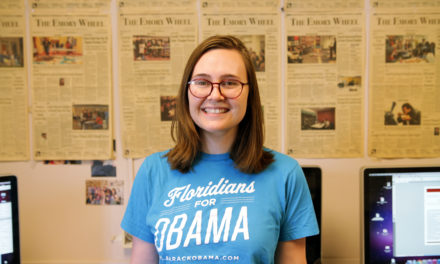In an email sent to Emory undergraduates Friday afternoon, Robin Forman, the dean of Emory College, announced a number of significant changes that will be taking place within the next few years. A similar letter was sent to students enrolled in the Laney Graduate School.
The letter announced the elimination, or “phasing out” of several undergraduate programs, including journalism, visual arts and educational studies. The economics and Spanish graduate programs have also been suspended for a minimum of five years, according to a statement from the University.
The changes, according to Forman, were undertaken in the pursuit of improving Emory’s “academic eminence.”
We at the Wheel support Emory’s attempts to improve its reputation amongst its peer institutions, and acknowledge that these changes were executed with the intent of improving the University as a whole. However, at this point, we are undecided as to whether the details of the plan are the proper steps. And while Forman has created committees to explore new areas of study (including contemporary China and the role of digital and new media), even he has said that he doesn’t have all of the details.
We do feel that we can comment on the way in which the University has acted with regards to communication and transparency.
While we applaud Dean Forman and other administrators in their recent efforts to communicate openly with the Wheel, we are shocked and appalled by the clear lack of communication between the College and those departments and faculty affected by its decision. Forman says that talk of these major changes began about two years ago (although the plan is rooted in a committee founded 4.5 years ago) and that the Board of Trustees approved these measures in June.
The fact that department chairs and their respective faculty and students were not informed while discussions were taking place, before the Board voted, or after the academic year started is a betrayal of trust on the part of Forman, President Wagner and other informed University officials.
Although these measures are undertaken in the pursuit of a specific academic mission, the lack of due process flies in the face of the University’s ethos that dares claim to be ethically engaged and inquiry-driven. By not consulting with the very people directly affected by this plan as discussions were taking place (i.e. faculty and student), Forman has jeopardized both his own legitimacy as a leader and his plan.
Furthermore, we at the Wheel object to the disingenuous manner in which the University first announced these changes. An email titled “A Letter from the Dean,” as Friday’s was, is decidedly ambiguous, especially when one considers that the email’s most significant content was in an attachment instead of being included in the body of the message. It is not an unforeseeable possibility that, on a Friday afternoon, a student might have simply ignored or deleted Forman’s email without a second thought.
But, regardless of the delivery, we are insulted that the content of the Dean’s letter failed to disclose all of the details and concrete effects of the plan. Precise details are provided on Emory’s news website but are buried in the “Campus News” page. The feature article on the “Campus News” page is about Emory’s environmental polices. Details regarding specific programs are available in an article titled “Academic Program Changes,” which can be found on the side under “Related Stories.”
It is not the intent of this editorial board to accuse the administration of foul play. Instead, as journalists we merely seek the truth in its entirety, and at this point, there are far too many questions and rumors to say that the communication process has been respectful and sensitive to Emory’s students, faculty and staff.
And just as we, The Emory Wheel, continue to learn more about the recent changes and continue to clarify the numerous rumors, we strongly urge that students and faculty be vocal in their opinions and discerning in their judgement.
The above staff editorial represent the majority opinion of the Wheel’s editorial board.
Photography by James Crissman
The Emory Wheel was founded in 1919 and is currently the only independent, student-run newspaper of Emory University. The Wheel publishes weekly on Wednesdays during the academic year, except during University holidays and scheduled publication intermissions.
The Wheel is financially and editorially independent from the University. All of its content is generated by the Wheel’s more than 100 student staff members and contributing writers, and its printing costs are covered by profits from self-generated advertising sales.







Actually there was a link in the email sent from Dean Forman to the Emory News Center article that also had links to the full letter to the Emory community, details regarding the academic plan changes and the committees that have been established.
Dear Emory Wheel,
Do you not see these moves to dismantle liberal arts education as an existential threat to the integrity and future of the Emory Wheel?
“However, at this point, we are undecided as to whether the details of the plan are the proper steps. And while Forman has created committees to explore new areas of study (including contemporary China and the role of digital and new media), even he has said that he doesn’t have all of the details.”
Are you kidding me? Y’all are not sure whether these are the proper steps? What exactly would it take for y’all to hop off the fence on this?
The foundation of the liberal arts at Emory University is being attacked during a BUDGET SURPLUS. Why?
I also challenge your assumption that….we “acknowledge that these changes were executed with the intent of improving the university as a whole.” What evidence backs up this claim? It would be naive to trust that the university administration is acting in the interests of the university as a whole.
#emorycuts
The fate of the humanities at Emory is indeed the crux of the matter. You will find the administration’s view of the humanities in the following paragraph, taken from the web page of the Institute for Quantitative Theory and Methods:
“A new view of liberal arts.
Although quantitative research hasn’t traditionally been considered a major facet of a liberal arts education, both educators believe it’s time to rethink that. In fact, Forman says there is a growing interest in the role of computational, quantitative techniques within the humanities, ‘to explore ideas and understand the dynamics that are shaping the culture.’
For example, Carrubba cites advances in the digital humanities movement and computational linguistics, which allow scholars to identify literary characteristics – such as sentiment or mood – and write computer programs to study that aspect in hundreds of thousands of books.
‘I can imagine having undergraduate humanities majors, social and natural scientists in the same class using the same skill set for very different purposes – an English major may be using the same skills that a biologist uses,’ Carrubba observes.”
This grotesque statement amounts to a continuation of 19th century Positivism and to the robotization of the humanities. Have you ever read computer translations of literary works, or even simple sentences? I wonder if computers –or the students of the future– can read irony or allusion or metaphor…
Ironically, this new Institute, which is probably being supported by funds recently reallocated from less fortunate departments and programs, is located on the first floor of the Modern Languages Building…
The Graduate Institute of Liberal Arts was also suspended. As was the case with most of the affected departments and programs, ILA faculty, staff, and students were completely blindsided by the announcement.
Follow @emorycuts on twitter and specifically #emorycuts for up to the minute information, commentary and links to articles from media outlets on the issue
“Furthermore, we at the Wheel object to the disingenuous manner in which the University first announced these changes. An email titled “A Letter from the Dean,” as Friday’s was, is decidedly ambiguous, especially when one considers that the email’s most significant content was in an attachment instead of being included in the body of the message. It is not an unforeseeable possibility that, on a Friday afternoon, a student might have simply ignored or deleted Forman’s email without a second thought.”
I have a few problems with this article, most of which are in this particular paragraph. I received several notifications on Friday about the announcement, each of which communicated the severity of the issues at hand and the extent of the cuts that had been decided, and most of which provided links to further information. And both Dean Forman and Dean Tedesco appear to have made efforts to discuss, in person, students’ concerns about the cuts.
And I really don’t see why the hypothetical situation in which a student might delete Forman’s email would therefore be Forman’s failure to communicate. That’s absurd.
What bothers me is that cuts are happening during a budget surplus, and the parties most effected (faculty and students) had no say in it. I could take or leave this paragraph. I can’t believe that’s your biggest problem with this article. Emory keeps shooting itself in the foot. First neglecting orders about awarding hours from accreditation boards, then manipulating ranking data, now cutting programs…
Emory doesn’t have much of a reputation left.
Please note that the released information doesnt’ tell the whole story. Russian is being eliminated as well and French and CompLit are brought under one structure. So far we don’t know of any other changes.
This opinion is pretty stupid. Do you think the Dean is going to have constructive criticism with the faculty on this issue? I envision the conversation going something like this:
Dean: “Dear Chair of X useless department, I know you and your colleagues aren’t cutting it, you also know it, so I’m probably going to fire most of you.”
Chair: “Ok, at least we were consulted.”
Wake up people–the reason the economics program was punished with the loss of the PhD program is because they’re totally not functional. For a school with Emory’s resources to have an economics program that ranks below Georgia State’s is a preposterous.
Hard decisions about resource prioritization have to be made, and that’s why Forman is dean and the authors of this piece aren’t. Maybe before writing these opinion pieces with no substance, the authors should consider the actual tradeoffs that the school faces.
This is one of the worst pieces of journalism I’ve seen. No wonder the school is getting rid of that program.
The Emory phd program in economics has gone up from about 70 to 40 in the past 5 years. It is in the top 50 for the nation, and on an upward trajectory. It is extremely shortsighted to dismantle it and essentially fire the faculty. So Emory undergrads will be paying out of the wazoo for a community college level education in economics once that happens.
…so being ranked 40 is an accomplishment now?
In a department that’s widely acknowledged to have terrible teaching? A department with only two professors who publish anything?
Emory econ is terrible. Period. It’s about time they started over.
You’re a retard
We’re Emory. We don’t do top 50. We do top 20, at least.
Please, sign the petition to save the PhD program in economics. Do not be anonymous, please, so that we have actual people behind the petition when it is presented to Emory’s president.
http://www.ipetitions.com/petition/save-emory-universitys-economics-phd-program/